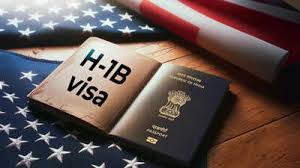Donald Trump might inflict a serious blow to the US tech sector, which depends mostly on workers from China and India, by signing a proclamation on Friday that would impose an annual $100,000 charge on H-1B visa applications.
At a press event on Friday, US Commerce Secretary Howard Lutnick stated that “all the big companies” had received information about the new fee.
“All of the major corporations are on board, and H-1B visas are worth $100,000 annually.” During a meeting with the US president at the Oval Office, Lutnick stated, “We’ve spoken to them.”
“If you’re going to train somebody, you’re going to train one of the recent graduates from one of the great universities across our land. Train Americans. Stop bringing in people to take our jobs,” he said.
Since the tech sector gave millions of dollars to Trump’s presidential campaign, his vow to crack down on H-1B visas has become a major issue of contention.
More than any other area of the US economy, the tech sector depends on people with H-1B visas.
According to official statistics, almost two-thirds of the positions obtained through the H-1B program are related to computers, but firms also utilize the visa to hire engineers, teachers, and healthcare professionals.
Over 10,000 H-1B visas were granted to Amazon in the first half of 2025, compared to over 5,000 for Microsoft and Meta Platforms.
An additional 20,000 visas are available for workers with advanced degrees under the H-1B program, which grants 65,000 visas per year to firms hiring temporary foreign workers in specialized sectors.
Many US IT workers are among the program’s detractors, who claim that it enables companies to reduce salaries and exclude Americans who could perform the tasks.
Proponents, such as Elon Musk, the CEO of Tesla, claim it attracts highly qualified personnel who are necessary to close talent shortages and maintain businesses’ competitiveness.
Musk, a South African-born naturalized US citizen, formerly had an H-1B visa.
Deedy Das, a partner at Menlo Ventures, a venture capital firm, wrote on X that the addition of extra fees “creates disincentives to attract the world’s smartest talent to the US.”
“The US will be much less able to innovate and expand its economy if it stops luring the best talent.”
The new fee has the potential to drastically increase expenses for businesses, especially startups and smaller IT companies.
During the briefing, Lutnick stated, “The individual is either extremely valuable to the company and America, or they are leaving and the company will hire an American.”
And that’s what immigration is all about. Employ Americans and ensure that the top candidates are hired. Put an end to the bullshit.
The executive branch’s authority to levy the astronomical annual charge is being questioned by immigration specialists.
Senior fellow Aaron Reichlin-Melnick of the American Immigration Council spoke on Bluesky: “The president has literally zero legal authority to impose a $100,000 fee on visas. None. Zip. Zilch. The only authority Congress has ever given the executive branch here is to charge fees to recover the cost of processing the application.”
Currently, H-1B candidates must pay a minor lottery entry fee and, if chosen, additional fees that, depending on the circumstances, can reach several thousand dollars.
Employers are required to pay almost all of the visa fees. The authorized duration of an H-1B visa is three to six years.
The action is the Trump administration’s most recent attempt to reduce or increase revenue from legal immigration.
The United States began a trial program last month that permits consular officials to require bonds of up to $15,000 for business and tourist visas from nations with low vetting records or high overstay rates.
Trump’s June travel ban, which limited immigration from 19 countries, followed.
A federal judge halted several restrictions that Trump’s first-term administration adopted with the intention of restricting access to H-1B visas and awarding them to higher-paying firms.

















